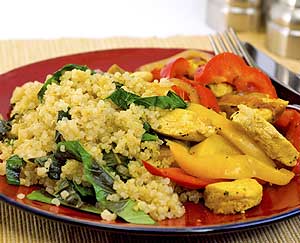Gluten Free
What does following a gluten-free diet mean? That you're embarking on an easy diet with a wide range of health-promoting effects. Instead of dwelling on what you’re giving up, consider that you’re going to enjoy a whole new world of delicious food options to meet your special dietary needs. You’ll be eating seasonally, choosing more fresh fruits and vegetables, focusing on meats, seafood, poultry, legumes, lentils, corn, and rice, and discovering fascinating ancient grains such as quinoa, amaranth, and millet. You’ll be able to eat potatoes, eggs, most cheeses, even chocolate (!)—and enjoy them without guilt because you’ll be taking good care of your body. In fact, you’ll probably end up eating—and feeling—better than ever!
Visit this page for more information about living Gluten Free
---
We carry a large variety of gluten free items, the brands listed below represent just some of the offerings we carry















More Diets
- By Maureen Williams, ND
Keep Body Fat Down with Whole Grains
When it comes to cardiac risk, it’s not just the amount of carbohydrate in our diet that matters, but also the quality. A new report describes how carbohydrate quality might affect heart health by altering body fat distribution. They found that people whose diets were high in whole grains had less of the type of fat that appears to be associated with higher cardiovascular risk (visceral abdominal fat, which is deposited between organs) than people with high refined grain intake.
Instead of a sandwich, have your lettuce, tomato and cheese, meat, or hummus with quinoa or brown rice and some dressing
The report, published in the American Journal of Clinical Nutrition, comes out of a large ongoing study called the Framingham Heart Study. Dietary information and abdominal fat measurements from 2,834 participants in the larger study were included in this report.
Whole grain eaters have less belly fat
For the dietary analysis, grains were put into two categories:
- Whole grains: Examples of these include whole grain cold cereals, oatmeal, brown rice and other cooked grains, dark bread, popcorn, and additional bran and germ.
- Refined grains: Examples of these include refined grain cereals, white bread, English muffins, bagels, biscuits, muffins, white rice, pasta, pancakes, waffles, crackers, and pizza.
Measurements of the visceral fat were lower in whole grain eaters and higher in refined grain eaters:
- People with the highest whole grain intake (more than three servings per day) had the least visceral fat.
- People with the highest intake of refined grains (more than four servings per day) had the most visceral fat.
Adding whole grains is not enough
Before you start thinking that you need only add some whole grain servings to your day in order to reap their benefit, consider the following: the study also found that people who ate lots of both whole and refined grains did not see similar improvements in visceral fat measurements as people who ate lots of whole—but not refined—grains.
“These findings suggest that if individuals are already eating several daily servings of refined grains, the inclusion of whole grains in the diet may not translate into lower amounts of visceral fat,” said lead study author Dr. Nicola McKeown of Tufts University in Boston. “Instead, efforts should be made to replace refined grains in the diet with whole grains.”
Making the switch
Here are some ways to replace refined grains with whole grains:
- Start with breakfast. Switch from sugary cold cereals to high-fiber whole grain cereals like shredded wheat, or experiment with hot cooked grains like oatmeal, buckwheat, or quinoa with some added fruit and nuts.
- Break the bread habit. Instead of a sandwich, have your lettuce, tomato and cheese, meat, or hummus with quinoa or brown rice and some dressing. If you really want a sandwich, use bread that lists whole grain flour as the first ingredient.
- Snack on popcorn. Treat yourself to a bowl of air-popped popcorn with olive oil and a little salt, chili powder, and nutritional yeast, and forego the cookies and muffins. Lemon and garlic are another tasty popcorn combination condiment.
- Choose whole grain pasta. Or better yet, choose one of the cooked whole grains like millet, unpearled barley, or brown rice.
While you’re at it, don’t forget about the other components of a heart-healthy diet: fruits, vegetables, nuts and seeds, legumes, and occasionally fish.
(Am J Clin Nutr 2010;doi:10.3945/ajcn.2009.29106)












